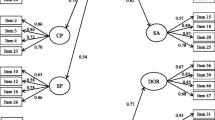Abstract
Little is known about cultural differences in psychological adjustment and perception of illness (PI) during medical procedures in general and radiotherapy in particular. This study compares a Turkish (TP) and a French speaking Belgian (BP) population. A group of 296 consecutive patients attending the radiotherapy clinic of Institut Jules Bordet, Brussels, (n = 172) and Oncology Institute, Çapa-Istanbul, (n = 124) were interviewed and assessed by a symptom checklist, the SCL-90-R, at the beginning and at the end of the radiotherapy. PI, derived from a semi-structured interview, was assessed at the beginning of radio-therapy by a five-point observer-rating scale derived from the Omega Vulnerability Rating Scale. Differences in SCL-90-R scores, taking into account country, age, gender, level of education and PI as potential explanatory variables, have been tested by a multivariate analysis of variance with a design of repeated measures using the SCL-90-R scores as dependent variables. Mainly a time effect and a country effect have been found. Some interactions between both effects have also been found. Globally, all the SCL-90-R scores decrease between the beginning and the end of the radiotherapy. The effect of country is noticeable for most of the SCL-90-R components, with higher scores in the BP, except for the positive symptom total score where the TP showed higher scores. The interaction between country and time is not significant, the scores of both the BP and TP decreasing over time, except for somatization scores (P < 0.001) where the scores of the BP were stable over time while the scores of the TP decreased considerably, and for paranoid ideation scores (P = 0.001) where the scores of the BP decreased while the scores of the BP increased. Results showed a higher rate of correct perception in the BP compared to the TP (P = 0.0001). A PI effect has been found for somatization (P = 0.02), anxiety (P = 0.01) and Global Severity Index scores (P = 0.05), with higher mean scores for the “correct perception” category. No interaction with time was found. A significant interaction effect between country and PI has been found for anxiety scores with higher scores in the correct perception category in the BP and in the “denial of implications” category in the TP (P < 0.001). Results highlight cultural differences in psychological adjustment and/or in the responses to self-report questionnaires: greater weight was given to items by the BP, more numerous items were scored by the TP, and greater weight was given to the somatization subscale compared to the psychological subscales by the TP. This study suggests that psychosocial distress is expressed differently in Belgium and Turkey, where patients express mostly somatic complaints. Finally PI, a culture-dependent factor, appears to influence psychological adjustment very differently, a correct perception of illness leading to more anxiety in the BP compared to the TP.
Similar content being viewed by others
References
Derogatis LR (1975) The SCL-90-R. Clinical Psychometric Research Unit, Baltimore, Md
Gordon D (1990) Embodying illness, embodying cancer. Cult Med Psychiatry 14:275–297
Holland J, et al (1992) Handbook of psycho-oncology. Oxford University Press, New York
Karnofsky DA, Ablemann WH, et al (1948) The use of nitrogen mustard in the palliative treatment of cancer. Cancer 1:634–656
Kleinman A (1986) Culture, the quality of life and cancer pain: anthropological and cross-cultural perspectives. In: Ventafrida V, Van Dam FSAM, Yancik R, Tamburini M (eds) Assessment of quality of life and cancer treatment. Elsevier, New York, pp 43–49
Leininger M (1988) Care, discovery and uses in clinical and community nursing. Wayne State University Press, Detroit, Mich
Levine J, Zigler E (1975) Denial and self image in stroke, lung cancer and heart disease patients. J Consult Clin Psychol 43:751–757
Matt AD (1988) Denial as a strategy for coping with cancer. J Ment Health Counsel 10:136–144
Nagia SA, Hoda ZK, et al (1993) A comparison of American and Egyptian cancer patient's attitudes and unmet need. Cancer Nurs 16:193–203
Othmer E, Othmer SC (1989) The clinical interview using DSM-III R. American Psychiatric Press, Washington, DC
Pfefferbaum B, Pasnau R, et al (1977–78) A comprehensive program of psychosocial care for mastectomy patients. Int J Psychiatry Med 8:63–72
Schmale A (1976) Psychological reactions to recurrences, metastases or disseminated cancer. Int J Radiat Biol Phys 1:515–520
Schoenberg B (1979) Sex after mastectomy: counselling husband and wife. Med Aspects Hum Sex February: 88–100
Silberfarb PM (1977–78) Psychiatric themes in the rehabilitation of mastectomy patients. Int J Psychiatry Med 47:159–167
Spitzer RL (1983) Structured clinical interview for DSM-III R. New York State Institute, New York
Weisman AD (1979) Coping with cancer. McGraw-Hill, New York
Wool M (1988) Understanding denial in cancer patients. Adv Psychosom Med 18:37–53
Author information
Authors and Affiliations
Rights and permissions
About this article
Cite this article
Erbil, P., Razavi, D., Farvacques, C. et al. Cancer patients psychological adjustment and perception of illness: Cultural differences between Belgium and Turkey. Support Care Cancer 4, 455–461 (1996). https://doi.org/10.1007/BF01880644
Issue Date:
DOI: https://doi.org/10.1007/BF01880644




